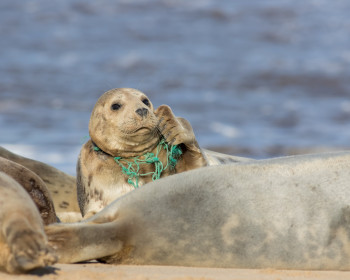What Is Animal Law? Animal Law LLM Thesis Work Showcases Broad Diversity of the Field
Open gallery

Passionate animal advocates from across the globe come to the Center for Animal Law Studies at Lewis & Clark Law School to obtain the world’s only advanced legal degree in animal law, the Animal Law LLM. In addition to immersing themselves in extensive coursework, our Animal Law LLM candidates produce and present a thesis that delves into the burning animal law issues of our time. The thesis work of our Animal Law LLM class this year perfectly captures the broad diversity of animal law and the many ways that our graduates plan to use their specialized knowledge to improve animal protection in the U.S. and abroad.
Please join us in warmly congratulating each of our Animal Law LLMs for their contribution to the field. Below, our candidates share, in their own words, the substance of their thesis and how their work will improve the lives of animals.

My thesis focuses on the welfare of fish in aquaculture. My goal is to synthesize relevant scientific and legal information to create a case for the development of a code of welfare for farmed fish in New Zealand. As with intensive farming of terrestrial animals, aquaculture presents many animal welfare issues. While farmed fish have historically received little attention – even from animal advocates – fish welfare is starting to gain prominence, thanks in large part to scientific evidence demonstrating the sentience and remarkable cognitive capabilities of fish. I envision my research leading to the implementation of welfare regulations for farmed fish in New Zealand and, given that fish now outnumber all other farmed animals worldwide, I hope my work will positively impact the lives of many individual animals.

My thesis discusses the elephant poaching crisis in East Africa by exposing the inefficacy of the current model within the criminal justice system, which views poached elephants as mere “depleted natural resources (things).” The current model has failed to protect elephants through prosecution, driving them towards extinction. My thesis argues for a new model, which identifies elephants as nonhuman victims of crime that deserve equal protection as human victims of crime in the criminal justice system. The recognition of elephants as victims will attach to them enforceable rights, capable of vitiating proceedings or sentence on their violation. My thesis recommends that heads of prosecution agencies in East Africa should invoke their mandates by promulgating regulations, directives, or guidelines which provide a spectrum of mandatory rights to be accorded to elephants during criminal trials by prosecutors.

As part of my thesis, I founded Help African Animals is a non-government organization based in Uganda. We protect animals through raising awareness about animal law. We specifically educate judges, magistrates, prosecutors, law enforcement officers and the general public about wildlife crime and crimes against animals, their nature and effect, the laws protecting animals and penalties for their violation. Through education, the lives of animals that would be killed are saved.

My thesis – titled “Wildlife Protection in Pakistan – An Overview of Statutory and Case Law” – analyzes the current status of laws and jurisprudence protecting wild animals in Pakistan. Through this project, I aim to fill the gap in legal scholarship around animal issues in Pakistan, as well as inform legislative and policy reform in the field. My analysis focuses on the historical development of wildlife protection laws and jurisprudence, the weaknesses and strengths of existing laws, as well as how superior courts in Pakistan approach wildlife disputes. The ultimate goal of this project is to provide a roadmap for strengthening wildlife protection in Pakistan – both through stronger legislation as well as more robust enforcement.

My thesis reviewed the intersection of Animal Law and Human Rights Law in the context of the rights of refugees and asylum-seekers to bring companion and other animals with them to countries of refuge, and how their lives are impacted by conditions in host countries. In developing countries, refugees and their animals have lived for generations in refugee camps, subject to conditions that are unsafe, unhealthy, and without consistent or effective policies to manage their various situations. As climate refugees continue to increase, especially in developing countries, it is paramount that we have laws and policies in place that help animals and their human guardians who are in camps and other difficult settings. I set forth my vision of a system of laws and policies that are needed to manage these problems, as well as to consider not just humans as refugees, but the possibility that animal refugees should also be recognized as having rights, whether that be through a reinterpretation of existing laws, or expanding upon current laws. I hope that my thesis will contribute to the expansion of dignity and rights for refugees and their animals, to promote understanding regarding the bonds that people and animals share, to recognize the impending climate crisis that requires us to take action, and that her model of proposed laws and policies would be considered as best practices and implemented as appropriate.

Chile is the world’s second largest producer of salmonids in the aquaculture industry, producing tens of thousands of tons per year, which implies the confinement and execution, for human benefit, of tens of millions of sentients, intelligent and cultural beings. Under such context, my work has the objective of providing a general image of the size, figures and material reality of this industry in Chile; of the standards of animal welfare erected by the national legislator, and the material situation of violation of those standards by the aquaculture practice developed by the salmon companies, with the complicity of the governing agencies in the matter. In addition to identifying the most pressing issues in this productive sector, my work also aims to propose some possible solutions, and to formulate certain ethical, ethological and economic reflections aimed at questioning the need and conditions under which this industry develops.
The importance of this work lies in the fact that it allows us to become aware not only of the injustices and suffering to which we subject these wonderful animals—and others—but also illustrates the disastrous environmental consequences it causes in the ecosystems surrounding the crops. Furthermore, the consumption of Chilean salmon can currently pose a danger to human health, and even favor the development of antibiotic-resistant bacteria. Thus, it is essential to make radical changes to current regulations and productive processes.

My thesis was based on the discussion of the possibilities to improve the protection of sharks on a global level through the power of international treaties and the development of a new legally binding instrument. Among all species of aquatic animals, I decided to focus on sharks due to the least receptiveness of consideration and the absence of public concern about these animals. My arguments consisted of the proposals and suggestions on how to strengthen the protection of sharks through strict fisheries regulations, monitoring the trade, developing a shark-focused treaty, and the possibility to sue under the rules of public international law. I believe that my paper will help raise awareness in communities all over the world, as well as in each individual who becomes familiar with my work.

Since an animal species only becomes a “food animal” under Kenya law upon the Secretary for Agriculture’s declaration by public notice (after public participation and stakeholder consultations), each of the 301,977 donkeys slaughtered in licensed abattoirs within 33 months was an illegal action in contravention of the Meat (Control) Act and the Constitution. It is likely that no single donkey would have fallen had the offending regulations (in effect for six years before the first cruel slaughter) been timely subjected to an arbitrary-capricious test judicial review challenge. As we plan to challenge the offending regulations, the experience underscores the critical role animal lawyers and strategic litigation play in helping animals and in creating awareness. Whether the donkey slaughter ban reduces supply, increases prices and leads to illegal slaughter or the pressure piled upon animals by economic development leads to intensive production; this moment calls for paying closer attention to animal protection laws with active government/stakeholder engagement as the country embarks in the transformation to industrialized production. By publishing the findings and opinions in my thesis, I hope that animal welfare organizations, law students, and animal lovers may be drawn to the idea of strategic interrogation of agency decisions, challenging laws, or lobbying for modification of regulations as critical and complementary to other forms of animal rights activism.

My thesis offers an avenue to animal protection through environmental rights, specifically how the environment has operated as a bridge for animal welfare. In the relations between human beings, the environment, and animals, that animals can have rights to the environment as a kind of substantive right in the form of animal rights receives less attention. Environmental rights are vital for animals for all aspects of their living, breeding, normal behavior, and physical and mental health. Especially for wildlife, habitat conservation is considered as a necessary and the most efficient avenue for protecting wildlife. My thesis offers the concept of environmental rights for animals, compares it with environmental rights for human beings, and then analyses the advantages and disadvantages in the application of this idea.

Since the beginning of the 21st century, China has experienced a dramatic explosion in its pet population, but the legal protection of companion animals is still far behind. My paper examines the current legal framework regarding companion animals in China, concluding that the concept of animal welfare is still not accepted in legislation, stray animal management policy, and judicial procedure. In it, I suggest China might witness a bottom-up revolution in animal law. By establishing minimum care standards in local regulations, reducing abandonment rates, and petitioning for legislation, a national animal protection law may be possible in the long term.
About the Center for Animal Law Studies
The Center for Animal Law Studies (CALS) was founded in 2008 with a mission to educate the next generation of animal law attorneys and advance animal protection through the law. With vision and bold risk-taking, CALS has since developed into a world-renowned animal law epicenter, with the most comprehensive animal law curriculum offered anywhere. In addition, CALS is the only program that offers an advanced legal degree in animal law and three specialty Animal Law Clinics. CALS is a nonprofit organization and is only able to provide these educational opportunities through donations and grants.
More Center for Animal Law Studies Stories
Center for Animal Law Studies is located in Wood Hall on the Law Campus.
MSC: 51
email cals@lclark.edu
voice 503-768-6960
Center for Animal Law Studies
Lewis & Clark Law School
10101 S. Terwilliger Boulevard MSC 51
Portland OR 97219

